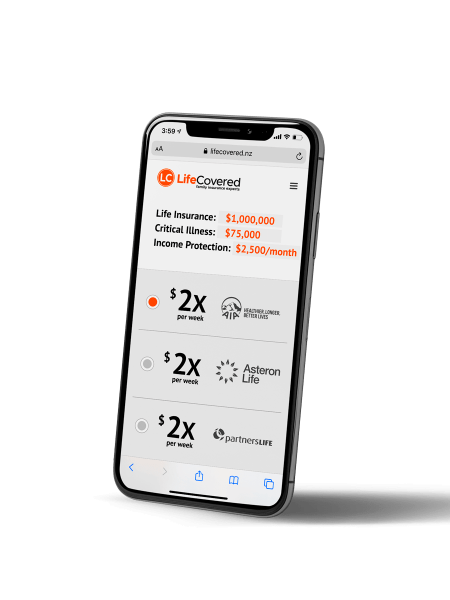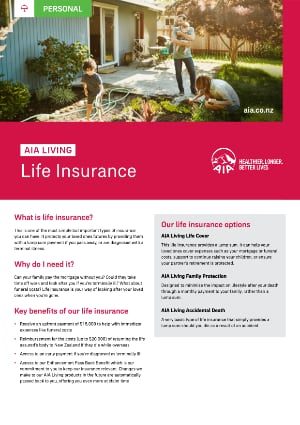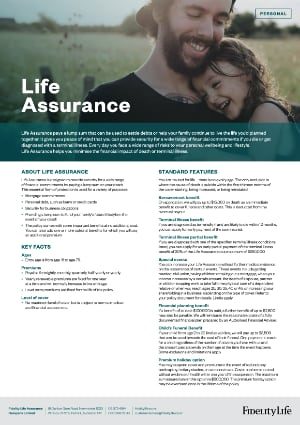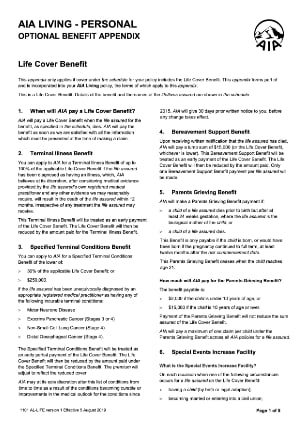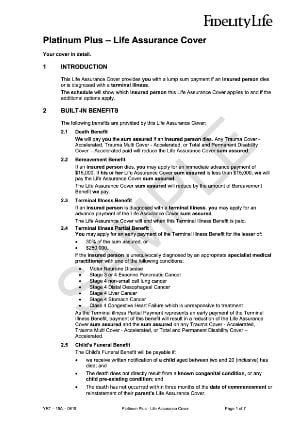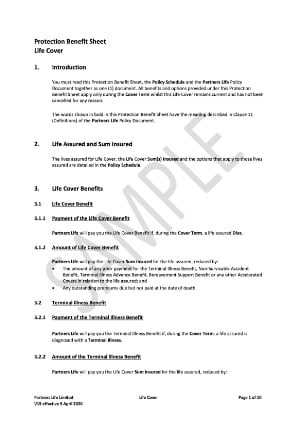Life Insurance
More than a policy
An act of love
Life insurance protects what matters to you. LifeCovered can help compare NZ life insurers and suggest a cover that’s right for you and your loved ones.
Compare Life Insurance Quotes Online





What is Life Insurance?
Life insurance is a contract between an insurer and a policyholder. A life insurance policy guarantees the insurer pays a tax-free death benefit to named beneficiaries when the insured dies or becomes terminally ill in exchange for regular premium payments made by the policyholder.
The death benefit is income tax exempt in New Zealand and is paid as a lump sum and helps give your family financial protection should you pass away – helping your loved ones maintain their living standard or pay the mortgage.
And if you are diagnosed terminally ill with less than 12 months of life expectancy, the tax-free death benefit is paid to you.
Our financial advisors can help you figure out how much you need. The cost of a life cover policy you buy as an individual depends on your age, gender, health, medical history and lifestyle.
How much life cover do I need?
You’ve worked hard to provide for your family and build wealth, so you and your family must be protected when life’s unexpected events occur.
This is where insurance planning and risk management play a critical part in your financial plan to ensure you’re not overinsured or underinsured.

The best way to figure out how much life cover you need is as part of a larger financial plan.
Our financial advisors can help you see gaps and strengths in your current financial situation and where you are headed.
We use a tool that helps you visualise and organise your financial life, so you can see and understand your financial picture like never before.
As we create your financial picture, you will have clarity and confidence about how much life cover you need. Because we look at your cash flow, debt management, retirements savings, potential property investment opportunities and what is acceptable risk to you.
Your thoughts on the best policy amount and type of policy could change considerably after seeing where life insurance will fit into the big picture for you and your family.
Compare life insurance types?
There are two types of life insurance policies available to meet all sorts of needs and preferences.
Depending on the short- or long-term needs of the person to be insured, the choice of whether to select Rate for Age or Level life insurance is important to consider.
Rate for Age
Annual (or yearly) renewable term is a one-year policy, but the insurance company guarantees it will renew the policy on each anniversary up until an agreed age, regardless of the health of the insured person, and with a premium set for the applicant’s age at that time.
Pros: Rate for age policies are the cheapest type of policy.
Cons: Premiums increase because of your age.
Level - Fixed Life Insurance
Level (fixed) term life insurance policy, where the premiums are set at the start and stay the same for the agreed period. Most commonly, fixed premiums until age 65, 70 or 80.
The insurer guarantees the premiums and cover amount don’t increase. You can select to index-link a policy. Indexation is an automatic increase to the amount of insurance coverage you have to make sure the impacts of inflation do not erode the value of your coverage.
When the time period comes to an end, most insurers convert your policy to a Rate for Age.
Pros: Premiums stay the same no matter your age.
Cons: Premiums start higher compared to Rate for Age.
Stepped vs level premiums
Rate for Age life insurance differs from level premium life insurance in several ways but tends to best meet the needs of most people.
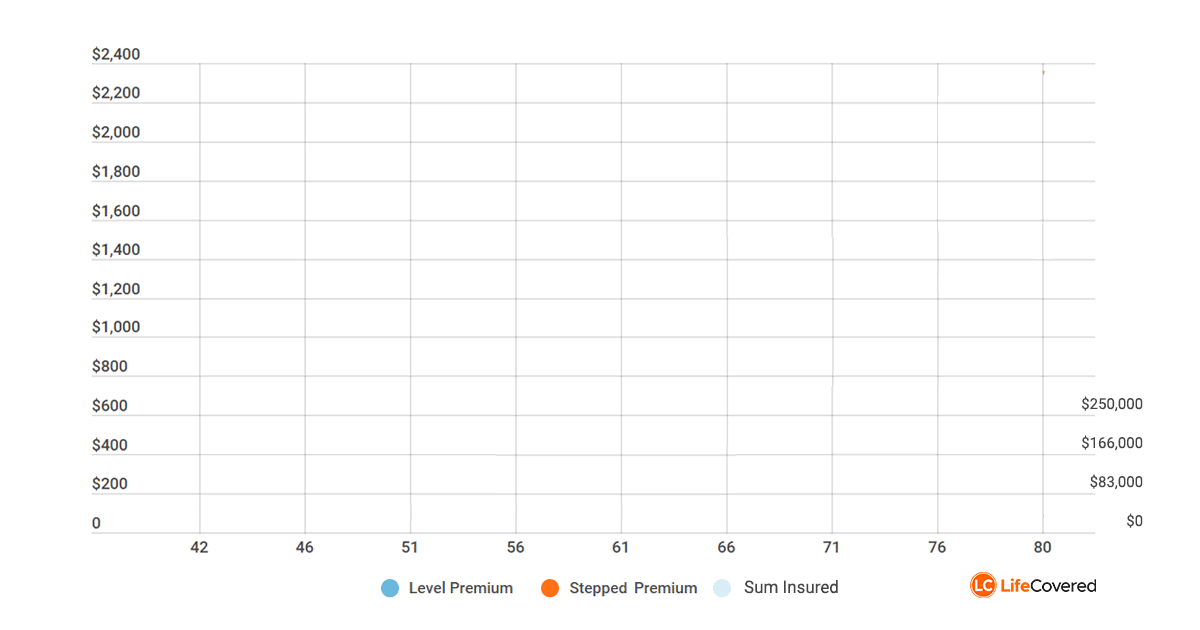
How does life insurance work?
Life insurance can help protect your family financially with a tax-free payout if you die or if you are diagnosed with a terminal illness (expected to live less than 12 months). You’ll get the one-off lump sum.
Your family circumstances are different and unique, but a life cover payout could improve your family cash flow significantly and help towards:
- Reduce or pay off the mortgage
- Finance Secondary school fees
- Pay funeral expenses
- Cover your salary
- Help with health and living costs if you become terminally ill
- Childcare costs
- Family holiday
In short, life cover can be used as wealth and asset protection.
What does life insurance cover
Tax-free one-off payment
There is no tax in New Zealand on Life insurance and therefore any benefit payout is tax-free.Top Financial Strength
We only compare New Zealand’s leading life insurers with the highest financial credit strength, which speaks about the ability to pay claims now and in the future.
Worldwide Cover
Policies provide you with worldwide cover, 24 hours a day.Guarantee Policy Upgrade
Your policy will benefit from future benefit enhancements automatically. And when circumstances change and time to claim, you claim will be assessed on the most favourable policy wordingWhat does life insurance not cover?
Suicide and self-inflicted injuries in the first year
If within the 13 months of the policy being issued you die as a result of suicide or intentional and serious self-injury, you are not covered.
Not paying your premiums
Policies that have lapsed and cancelled have no cover.
Hazardous Activities and Pursuits
Some hazardous activities and pursuits are uninsurable.Key Life Cover Features
Terminal Illness Benefit
If you are diagnosed with a terminal illness with a life expectancy of fewer than 12 months, the Life Cover benefit is paid early in cash.
Special Events Increase Facility
It enables you to increase the sum assured under your cover following a significant event in your life, resulting in increased financial responsibilities. These important events include: having a child, your child starting secondary school, taking out or increasing a residential home loan or receiving a salary increase and other significant events covered.
Serious Illness Cover
Sometimes called Critical Illness Cover (includes about 50 different illnesses and treatments), it can be added to the life cover at an extra cost when you take out your life insurance policy.
The Life Insurance Policy
A Life Insurance policy is a contract between an Insurance Company and you (the policy owner). It’s an agreement that, in the event of your death, the Insurance Company will pay the sum insured to your loved ones (or to you, if you are terminally ill and expected to die within 12 months). Your cover is fully tailored and takes into account your age, medical history and personal lifestyle.
A customised insurance policy is necessary to ensure the financial stability of your loved ones, in the event that a tragedy occurs.
How to find the best life insurance policy
We exclusively compare and recommend the leading life insurers in New Zealand, based on the following criteria:
- the highest credit rating: speaks about the financial abilities and liquidity to pay your claims.
- Claims culture and underwriting:
- Increasing premiums and fixed premiums:
- Automatic Policy Upgrading:
- Riders or optional extras:
Why?
Life insurance can be a long-term purchase and you’d want a company that has the strongest financial rating to pay claims.
During 2019, the best life insurance companies in NZ paid out more than $800M in claims combined.
| International Credit Agencies | Minimum Credit Rating |
|---|---|
| A. M. Best | a- |
| Fitch | A- |
| Moody's | A3 |
| Standard & Poor's | A- |
How much does life insurance cost?
Several factors contribute to the price of your life insurance policy. Understanding this can help make the application process smoother and ensure you make the best decision regarding value for money and protection for your family.
Some of the factors that determine the cost of a life insurance policy are:
- Gender
- Health
- Age
- Your hobbies/lifestyle
The type of coverage (rate for age vs. level), the term length, and the coverage amount
A level premium cover is budget-friendly, with premiums that don’t increase. See the graph below comparing fixed quotes for a healthy, non-smoking male from age 40 until age 80.
How to buy life insurance?
Your employer might offer you to become part of their group life insurance at discounted rates or as an employee benefit.
This would be a great place to start because, generally, you would be accepted without any underwriting.
Otherwise, you can work with a financial professional who can guide you through the options that will fit your immediate needs and long-term goals.
Life Insurance FAQ's
Who gets my life insurance when I die?
If you have died, the claim will be paid to the policy owner (often your partner or children) or beneficiary, and if no policy owner or beneficiary is nominated, the funds will be paid to your estate.
Can I get critical illness cover with life insurance?
Your life insurance application can be approved within hours or take a few weeks.
The approval process depends on the information you provide. If we have complete information and there are no medical issues to consider, the cover may be issued shortly after receipt of your application.
It may take a few weeks for applications that require more detail to process, such as medical reports, depending on how quickly you or your doctor can respond to requests for information.
You will automatically be given 60 days of temporary cover while your application is assessed. Terms and conditions apply, and the maximum life, trauma, and TPD benefit is $500,000.
How long does the application process take?
Your life insurance application can be approved within hours or it could take a few weeks.
The approval process depends on the information you provide. If we have complete information and there are no medical issues to consider, the cover may be issued shortly after receipt of your application.
For applications that require more detail to process, such as medical reports, it may take a few weeks, depending on how quickly you or your doctor is able to respond to requests for information.
You will automatically be given 60 days of temporary cover while your application is assessed. Terms and conditions apply and the maximum life, trauma and TPD benefit is $500,000.
Can I buy life insurance with a medical condition?
Medical conditions such as high blood pressure, diabetes, high BMI or even a history of cancer won’t necessarily prevent you from getting life insurance, but you’ll want to shop around to make sure you find the best rates for your health history.
Am I eligible to apply for life insurance?
- Be a permanent resident and physically in New Zealand at the time of application.
- Be aged between 10 and 75 years.
Parent’s or legal guardians must consent where Life/Child to be Assured is less than 16 years of age and older than 10.
Can migrants on a work visa buy life insurance?
Migrants on a work visa, residence visa, or business visa valid for less than 24 months can, in most cases, buy life insurance.
Other benefits, such as trauma cover, disability insurance, total permanent disability, and accidental death cover, may be offered individually.
Can I claim if I have been diagnosed with a terminal illness?
Yes.
If you have been diagnosed with an incurable disease and are expected to live less than 12 months, you may lodge a claim for your life insurance policy to be paid out.
You may want to spend the money on palliative care to improve the quality of life or travel the world as a last wish. Either way, it’s your money and your decision.
How soon is funeral support paid out?
AIA, Asteron Life, and Fidelity Life all have an inbuilt policy feature that pays out $15,000, and Partners Life pays out $25,000, helping your family with funeral costs while the claim is being assessed.
The Bereavement Support benefit is paid out immediately upon notification of death.
Do I need life insurance when taking out a mortgage?
When taking out a mortgage, most lenders expect you to get life insurance so that your life insurance policy will pay off your mortgage if you die prematurely.
But it’s worth knowing that you don’t have to get life insurance from your mortgage provider; our life insurance experts can help you and your family with short- and long-term life insurance coverage from any insurer that is right for you.
You’ll need to work out whether you want your life insurance to cover your mortgage or your dependents to get a payout on top, too.
If you need help comparing the various options and policy details, contact one of the advisers at LifeCovered on 0800 259925 (Mon-Thurs 9 a.m.–7 p.m., Fri 9 a.m.–5 p.m., Sat 9 a.m.–1.00 p.m.).
Key Documents - please read
Please read before you apply.
Life Insurance Policy Wording
The life cover policies for AIA Insurance, Asteron Life, Fidelity Life and Partners Life are included here.
1) The AIA Living Umbrella wording is common to all AIA Living policies.
2) Asteron Life has all it’s personal insurance policy in one document.
